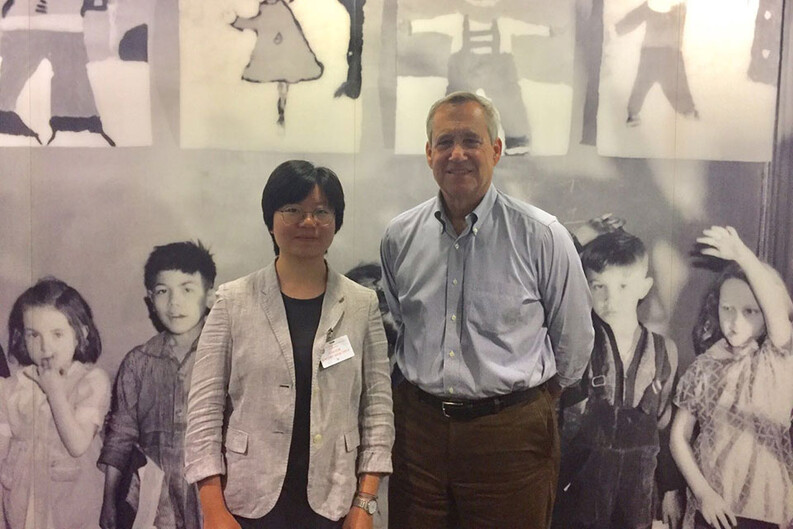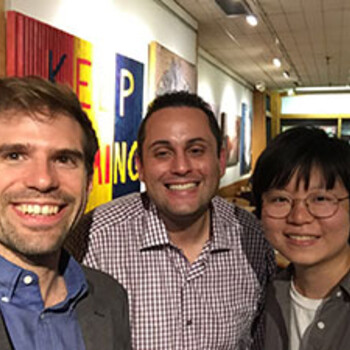Tsai Center Visiting Scholar Liu Mingke Advocates for LGBT Students

Both in China and the United States, LGBT students disproportionately suffer harassment and violence at school, harming their well-being and educational attainment. In a 2016 survey by Common Language (同语 ), an LGBT organization based in Beijing, 40% of college and secondary school student respondents reported bullying against LGBT students in their schools. Consistent with research results from the United States, Common Language also found that LGBT student experiences with bullying correlated with poorer mental and physical health, academic performance, and interpersonal relationships.
LIU Mingke (刘明珂), a Legal Program Officer at Common Language, is helping to lead the effort to make schools more supportive of LGBT students. "In 2016, the government started issuing policy documents on bullying," Liu said, referring to a period when a series of high-profile bullying incidents sparked widespread public discussion. "So far, these policies do not take sexual and gender diversity into consideration, but this discussion has created a good opportunity for advocacy." Despite the increasingly difficult political environment civil society organizations face in China, Common Language, along with several other LGBT NGOs, have been joining the policy discussion through research publications, media outreach, and government engagement.
Reflecting on Common Language's strategy to educate policymakers, Liu noted that much of the research and writing on school bullying in China is very limited. "There's still a lot of uncertainty about how to define it, and most policy proposals seem stuck on lowering the age of criminal responsibility and increasing punishments." Indeed, according to a 2016 article in the online magazine Sixth Tone, one of the Chinese Communist Party's top legal officials called for posting police in all schools to clamp down on bullying behavior—a position that is also common in the United States.
To add a different voice to the discussion in China, Liu came to Yale Law School's Paul Tsai China Center in September 2017 to research and write about legal and policy approaches to creating safer schools. "The United States has a lot of instructive experience—both good and bad—to draw upon," said Darius Longarino, Senior Fellow at the Paul Tsai China Center, who worked closely with Liu on her research project. "We wanted to examine how anti-bullying laws could better protect and support LGBT students, but also how creating such laws could avoid intensifying policing and criminalization of student behavior." While at Yale, Liu met with an array of experts and stakeholders including high school students, teachers, and administrators, state and federal government officials, NGO advocates, psychologists, and legal academics, including Emily Bazelon, a Senior Research Scholar at Yale Law School and author of Sticks and Stones: Defeating the Culture of Bullying and Rediscovering the Power and Character of Empathy. Through these interviews, Liu explored the constellation of debates on anti-bullying laws and policies in the United States—their benefits, drawbacks, and limits—and assessed how they might inform policymaking in China.
"By hearing experiences from widely varying perspectives, I was able to get a comprehensive grasp of the issue," Liu recalled. "It would have been really hard to understand these experiences if I hadn't personally come to the United States. It was an extremely helpful and rare opportunity."

"I am skeptical this problem can be legislated away," Bazelon shared with Liu in an interview early in her visit. "I think it is more about changing the relationships in the school, such as bettering the relationships between teachers and students, and trying to foster a positive culture through positive reinforcement."
Echoing Bazelon, Dr. Jo Ann Freiberg, a consultant at Connecticut's Department of Education in charge of improving school climate, cautioned that laws focused too much on reporting and investigating incidents of bullying are often counterproductive in practice. Many schools are known to underreport to avoid reputational harm, while others nervously over-enforce to avoid liability. "Legislation should focus on creating safe school environments for all—including LGBT students—rather than on processing investigations," Dr. Freiberg shared. "It is better to tell schools what they have to do rather than have them waiting around to respond to an incident. I would avoid the name 'anti-bullying law' altogether, because it shifts the focus."
To see how this philosophy works on the ground, Liu visited Westbrook High School in Connecticut, where she interviewed students, teachers, and Westbrook Public Schools Superintendent Patricia A. Ciccone, who designed and created one of the first comprehensive school-district-level policies in the United States on improving school climate. Superintendent Ciccone has not altogether done away with investigations and punishments for bullying incidents but has prioritized trainings, courses, and extracurricular activities aimed at cultivating communities where every member is treated with dignity and is free from harassment and discrimination. "It can take a long time and can meet a lot of adult resistance. Many have the mentality that consequences to behaviors are not effective if they are not punishments. But the trainings have been so great and transformative." Student peer educators attested to how this multi-faceted approach made the school a more inclusive and supportive environment. Teachers also explained how restorative practices have been used to address instances of bullying and general conflict at school, with better and longer-lasting outcomes than purely punitive measures.
David Esquith, Director of the Office of Safe and Healthy Students at the U.S. Department of Education, thinks the shift in emphasis away from punishment has yielded noticeable benefits. "From 2005 to 2011, 28 percent of students would report that they were bullied," Director Esquith told Liu at an interview in his office in Washington, D.C. "After 2011, it dropped to 22 percent. I think it is because we have taken a more holistic and preventive approach. We have started looking at students who bully as needing assistance as opposed to needing punishment." Dr. Freiberg said this is very different from the old attitude of "just saying you're wrong, you're suspended, and you're out."

Upon returning to Beijing, Liu synthesized her research findings in Common Language's School Gender-based Violence: Empirical Research and Policy Recommendations (《校园性别暴力:实证研究与政策建议》), and presented at a conference on January 15-16 organized by Common Language, UN Women, and the United Nations Development Program entitled "Elimination of Gender-based Violence through Legal Advocacy." In attendance were representatives from the All-China Women's Federation, a delegate to China's National People's Congress, SUN Xiaomei (孙小梅), scholars from universities and think tanks, mental health and social work professionals, police officers, as well as fellow civil society advocates.
Among her recommendations, Liu argues for clearly enumerating sexual and gender minority students as protected classes in future anti-bullying regulations and laws in China. In her report, Liu writes, "Many school managers, teachers, and administrative staff are not familiar with gender and gender pluralism concepts. When they encounter gender-based violence at school, they are not able to identify it as a kind of bullying." According to Liu, "Clear enumeration puts out a signal from policymakers that the law is aware of the problems these students face and that it wants to respond to these problems."
While it is important for laws to set the general tone, Liu also emphasized the need to avoid a one-size-fits-all approach and give schools and districts space to create their own mechanisms for dealing with bullying incidents and creating positive school environments. Central to this is not requiring excessively punitive measures such as "zero tolerance" policies, and letting schools pursue restorative practices as appropriate. Schools can also join with local civil society organizations to provide education and training to students and teachers about gender pluralism and strategies for building inclusive school environments.
Liu and Common Language are building on their research with new advocacy efforts. In preparation for the annual March meeting of the National People's Congress, Common Language along with 20 NGOs and leading legal experts sent policy proposals to National People's Congress delegates calling for delegates to pass laws to protect LGBT students and to promote gender pluralism education in schools. Although it remains to be seen whether any delegates will support the proposal, the organizations' advocacy has already been picked up by Chinese media, raising awareness of the issue.
The grassroots effort to achieve express legal protections for the LGBT community in China evokes an oft-quoted Chinese proverb: "the burden is heavy, and the road is long." Nevertheless, Liu remains optimistic. "Like domestic violence, the government is very concerned with school bullying, and we are just asking it to expand the scope of legal protection to include everyone. Through this we can end the conspicuous silence about sexual and gender minorities in Chinese law. For this, I have a lot of hope."


